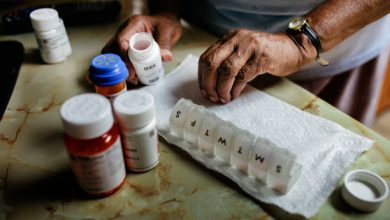Montell Jordan Overcomes Prostate Cancer; This Saved His Life – BlackDoctor.org


Montell Jordan, the smooth-voiced R&B singer responsible for the #1 hit guaranteed to get everyone singing along, “This is How We Do It,” recently got very personal and emotional on his birthday when he revealed that he is now cancer free. After silently enduring prostate cancer, Montell is ready to share his story.
In the video, Montell doesn’t physically share any words, instead he uses handwritten signs and turns the page through each one to tell the story. One slide says that his wife, kids and extended family has been his tribe. Another slide wrote that his church was an incredible inspiration to keep going.
Throughout the video, Jordan shared what he learned: He said he can do hard things, but he can’t do hard things alone.
This Is What Montell Said Saved His Life
Further in the heartfelt video, he says that early detection saved his life. And honestly, it can save the life of so many other Black men.
Prostate cancer can be detected early through screening tests, which are available for men without symptoms. The two most common tests are:
- Prostate-specific antigen (PSA) test
A blood test that measures the level of PSA, a substance produced by the prostate. PSA levels vary with age, and higher levels can indicate a problem with the prostate, including cancer. However, PSA levels can also be elevated by other conditions, such as prostatitis and BPH. - Digital rectal exam (DRE)
A physical exam where a doctor inserts a gloved finger into the rectum to feel the prostate for lumps or other abnormalities. DRE is no longer recommended as a routine test for men without symptoms.
If either test is abnormal, further testing may be needed, such as a prostate biopsy, MRI scan, or transrectal ultrasound (TRUS) biopsy.
Early detection of prostate cancer is important because it can lead to a better prognosis. Almost 100% of men with early-stage prostate cancer survive more than 5 years after diagnosis, compared to about one-third of men with advanced prostate cancer.
The video further describes that he researched all options for treatment and prayed hard. And on November 5th, he had his prostate removed.
Montell’s Prostate Cancer Treatment
After having his prostate removed, Montell can expect to experience a number of changes, including:
- Urinary incontinence
The inability to control your bladder. This can include leaking, dribbling, or overflow incontinence. It’s usually most severe immediately after surgery and can improve over time, but it can take up to a year for full recovery. - Erectile dysfunction
The inability to achieve a full erection. Recovery can take up to two years and may not be complete. A nerve-sparing prostatectomy can reduce the risk of impotence, but it doesn’t guarantee that it won’t happen. - Dry orgasm
You can still have an orgasm, but there will be no ejaculation. This is because the prostate and seminal vesicles, which produce most of the fluid for semen, are removed during the surgery. - Infertility
You will no longer be able to make someone pregnant. - Lymphedema
A rare complication where fluid accumulates in the soft tissues, causing swelling in the legs or genital region.
You can also expect to take off work for three to four weeks after surgery, but you might be able to return to work sooner if you work from home. You should avoid strenuous activity or heavy lifting for at least one month. You might also need to limit gas-producing foods like beans, broccoli, cabbage, and garlic.
Other Kinds of Prostate Cancer Treatment
Other kinds of prostate cancer treatments available to Montell included:
- Radiation therapy
This treatment can be used to treat cancer that’s confined to the prostate, or after surgery to kill any remaining cancer cells. There are two types of radiation therapy:
– 1. External beam radiation: A machine moves around the body directing high-powered energy beams at the prostate cancer.
– 2. Brachytherapy: Radioactive sources are placed inside the prostate tissue. - Hormone therapy
Also known as androgen deprivation therapy (ADT), this treatment blocks cancer cells from getting the hormones they need to grow. - Active surveillance
This treatment is for low-risk prostate cancer, where regular tests are performed to monitor the cancer for changes. - Other treatments
These include chemotherapy, targeted therapy, cryotherapy, high-intensity focused ultrasound (HIFU), and immunotherapy.
If You’re a Black man over 45. Here’s What You Should Do
If you’re Black, have a prostate and you’re over 45, speak to your GP about your risk of prostate cancer. We also strongly recommend you speak to them about having a PSA test (a blood test that can help diagnose prostate cancer).
There are advantages and disadvantages to having a PSA test. You’ll need to talk to your GP or practice nurse about these before deciding whether to have one. Remember to tell them if anyone in your family has had prostate cancer or breast cancer.
Late in the video, the “Tonite” hit singer shared that during his surgery the got ALL of the cancer and now he is cancer free!
In the caption of the video, Jordan shares a simple message:
“I love you. I’m doing something unthinkable. I need your help.
I only have a few simple requests.
Watch until the end and then:
1. Pray
2. Take action. Give if you are moved.
3. Share
Thank you.”
Montell is now known as a man who uses the gift of music as a vehicle to transport people into the presence of God. This Grammy nominated, multi-platinum recording artist has had numerous billboard number ones, and is now an executive pastor of a mega church.




